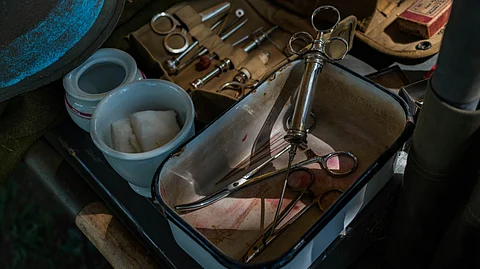

He had been in the Army for just a year when he was sent to Kargil to serve as the 13 Jammu and Kashmir Rifles' Regimental Medical Officer (RMO). He had to make sure that every wounded soldier lived till they arrived at the tertiary care 153 general hospital in Leh, while his comrades had to recover the land lost in the Himalayas.
On the high altitude Kargil battlefield, 97 men received first aid from Colonel Rajesh W. Adhau, Sena Medal, a Captain at the time, under shelling and gunfire.
Nine of the 14 men who died in Colonel Adhau's presence were hit in the head by bullets and passed away right away. “Before the battle commenced at Kargil, I had briefed the 13 JAK men that I don’t worry about injuries, I won’t let you die,” said the decorated war veteran, Colonel Adhau.
One of the soldiers Adhau had rescued was Sena Medal bearer Captain Naveen Nagappa, who had been injured by a grenade blast. An enemy grenade had exploded between Nagappa's legs during an effort to seize point 4875, leaving him immobilized. Captain Vikram Batra, the recipient of the Param Vir Chakra (PVC), pulled him to safety. After crawling a short distance, he was picked up by a jawan and taken to the RMO like a gunny bag.
“As soon as I was brought to Adhau, he started removing splinters and shrapnel from my injured limbs and kept me engaged in conversation to divert my attention from the pain and to keep me in a conscious state. His efforts prevented further blood loss and ensured that infection didn’t spread by the time I reached the hospital for surgery,” said Captain Nagappa.
He said, “During war, the RMO holds a crucial portfolio, as he must save lives. Therefore, he is generally positioned away from the range of small arms. However, the danger of being shot by a heavy machine gun or blasted by a rocket is always present for the RMO as well, as he is literally saving lives on the battleground.” Adhau, a doctor from Talegaon (Shamji Pant) village in Wardha district, Maharashtra, is among the few doctors to have received a gallantry Sena Medal for his service in the army.
He is currently assigned to the UN peacekeeping mission known as MONUSCO (Mission de l'Organisation des Nations Unies pour la stabilisation en République démocratique du Congo), also known as the United Nations Organisation Stabilisation Mission in the Democratic Republic of the Congo. He is responsible for the Indian Level 3 (tertiary) hospital in Goma. The hospital serves over 17,000 men and women from all over the world, including Pakistan, Bangladesh, South Africa, Nigeria, Nepal, and other countries involved in the UN peacekeeping mission. Its Indian medical staff consists of 23–25 specialists. Recently, 52 doctors from at least 14 different countries—both military and civilian—shared Colonel Adhau's experience from Kargil as well as cutting-edge methods and best practices in combat trauma management at the UN mission.
“During war, first aid in the golden hour is crucial for a life to be saved, but I have gone further ahead with my war experience. I believe medical treatment within 10 minutes of injury, which I call platinum minutes, greatly increases the chances of survival. An antibiotic, anti-inflammatory, gauze, iodine and vitamin C in the pocket of a soldier in the combat field is a must. This is what I had done back in the Kargil war for every soldier as the RMO. Immediate administration of antibiotics to an injured soldier provides sufficient time, up to eight hours, for the medical team to start treatment and save lives,” said Colonel Adhau, the 51-year-old sports medicine specialist. He added, “The will to live and morale of an injured soldier immediately increases on the battlefield if he is administered first aid and evacuated early. Those 97 men whom I had given first aid to in the Kargil war now live normal lives. Only four underwent limb amputation surgery to prevent further infection.”
Lieutenant Colonel Yogesh Kumar Joshi, Vir Chakra, who was the 13 Jammu and Kashmir Rifles' former commanding officer during the Kargil War, later retired as a lieutenant general and the commander of the Northern Army, stated in a tweet “Colonel Rajesh Adhau is a very energetic doctor, who has been by my side through thick and thin, war and peace and continues to save lives.”
“Rajesh was available right in the front, which was very reassuring for soldiers. He indeed saved many lives. Because of the proximity of the enemy, the only way to evacuate casualties was on stretchers. The helicopters or mules couldn’t come up. So, a doctor being available amid heavy firing with the enemy was a big morale booster.” said Joshi.
(Input from various sources)
(Rehash/Priyanka Pandey/MSM)
